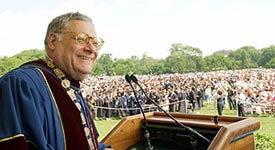 |
|
Published May 16, 2004
Are they all right? Like anyone, I had a sense of horror at this act of terror and sense of grief for all those killed and maimed and their families and friends. But my first feelings were almost tribal: how are my people? As it turns out, all of them, all 36, were all right. Not one of them was hurt. That good news, I confess, made my grief and horror more bearable. I took two lessons from this experience, and they will be the topics of my brief talk to you this morning. The first lesson is the sense of community we like to talk about at GW is real. It is not an empty phrase or just convenient shorthand for referring to all the men and women who work and study here. There is something – something very deep though, I admit, not always visible to the naked eye – that binds us. We all have a share in a common enterprise, which is the dual mission of learning and service of The George Washington University. We go about our parts in this enterprise in different ways. And considering that there are nearly 25,000 of us – when you count all the students, the faculty, and the staff – we naturally go about our parts in the enterprise without intimate knowledge of everyone else involved in it. But the University is our common denominator. I am glad that we were spared the tangible and melancholy evidence of community. But I am convinced, and glad, that we understand our common bonds just as clearly without it. And I am hopeful, even confident, that all of you have profited from our sense of community in your time here – that your learning and your degree will not be the only durable things you take away from GW. My second lesson was that the unspeakable assaults in Madrid are a signal to look at the world from a new point of view. I thought of Madrid as the new Guernica. In 1937, in a dress rehearsal for the second world war, German aircraft, fighting as proxies for the Spanish Fascists against the Republic, bombed the defenseless town of Guernica in the Basque country in the north of Spain. It was a chilling demonstration of terror. The destruction of Guernica inspired Picasso’s famous painting of the same name. If you have seen it, you recall the distortion of the people and animals being destroyed under the bombs. You see the uncomprehending terror in their faces. What, they seem to be screaming, is happening? Why? How? The techniques of terror used in Madrid as well as in New York, Washington, Bali and Riyadh were different from the aerial bombing of Guernica. But the uncomprehending fear, the death, and the grief and horror in the aftermath were the same. So is today different? Is it more violent or cruel than any other time in world history? Possibly not. But the dangers come dressed in different clothes, the violence has new modes of expression and obscure motives. It is as if, without warning, you and all of us have been given a new system of weights and measures, which we still do not fully understand but which we must use to figure out how things work and what we can do about it. It is daunting. Trying to make sense of new things always is. The earth is round and revolves around the sun? No, really? It takes time to adapt to the new – and it takes gumption because you have to discard old beliefs and comforts. Daunting, but I hope not too discouraging. Because those throughout history who have always adapted to the new have been people like you – the well educated, often the young rather than their elders, people who can learn the language or the weights and measures of the world. People like you and your brother and sister graduates all across America. You have the learning, the sense of community, and the guts to make sense of the world – and even leave it at more peace. That’s no small undertaking, I know. The late great statesman and former GW professor, Abba Eban, said, “There won’t be peace in the world until we love our children more than we hate our enemies.” We have not yet learned to do that – it too has proved challenging. But maybe not for you and your generation. You see, I have unbounded faith in you. I know you will understand the new, and often frightening terms of the world. I know you will be encouraged, not dismayed or overcome, by the demands of peace. And I know you will do all of this while going about the business of life – working, raising families, and making your gardens grow. You will be busy, but I believe that you will not be overwhelmed. Not at all. In the face of this, I see you growing and prospering and exulting in your lives. And as you do so, I ask you to remember this academic community and to stay in touch so that those who follow can learn from your lives and be inspired by your accomplishments. God bless you
all. ©2004 The George Washington University Office of
University Relations, Washington, D.C. |
|||


